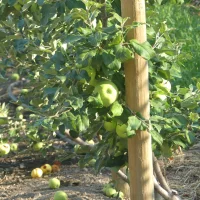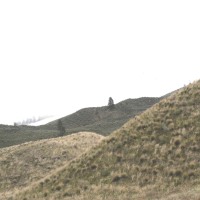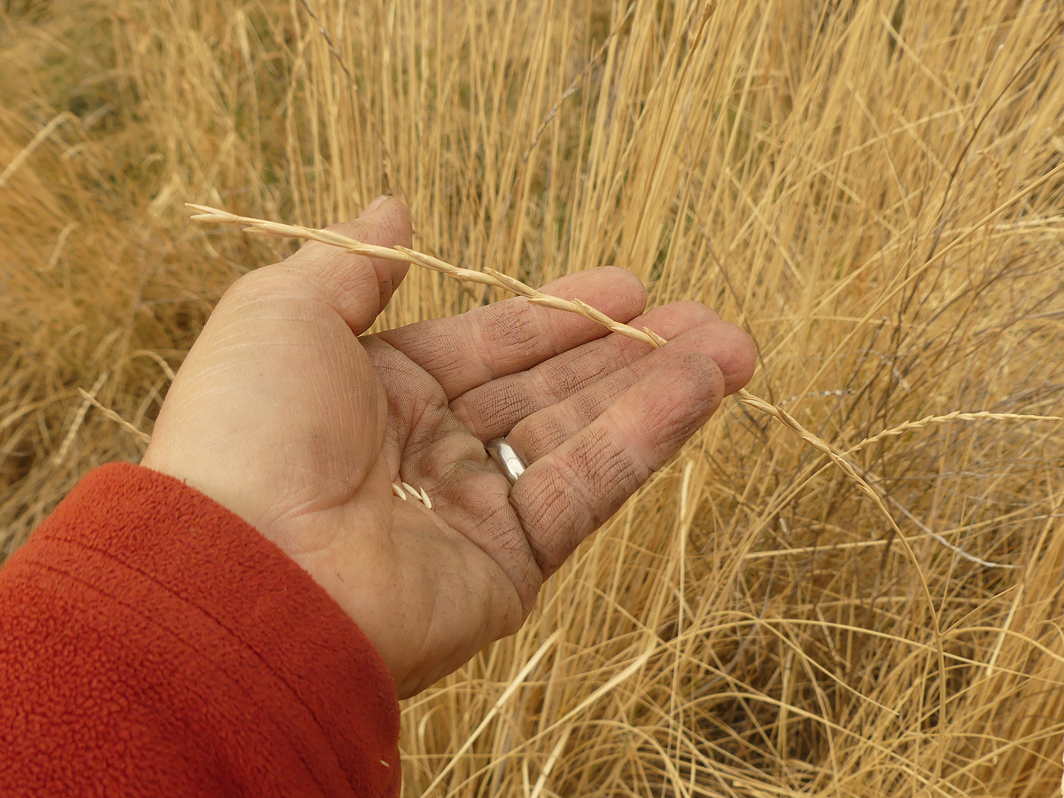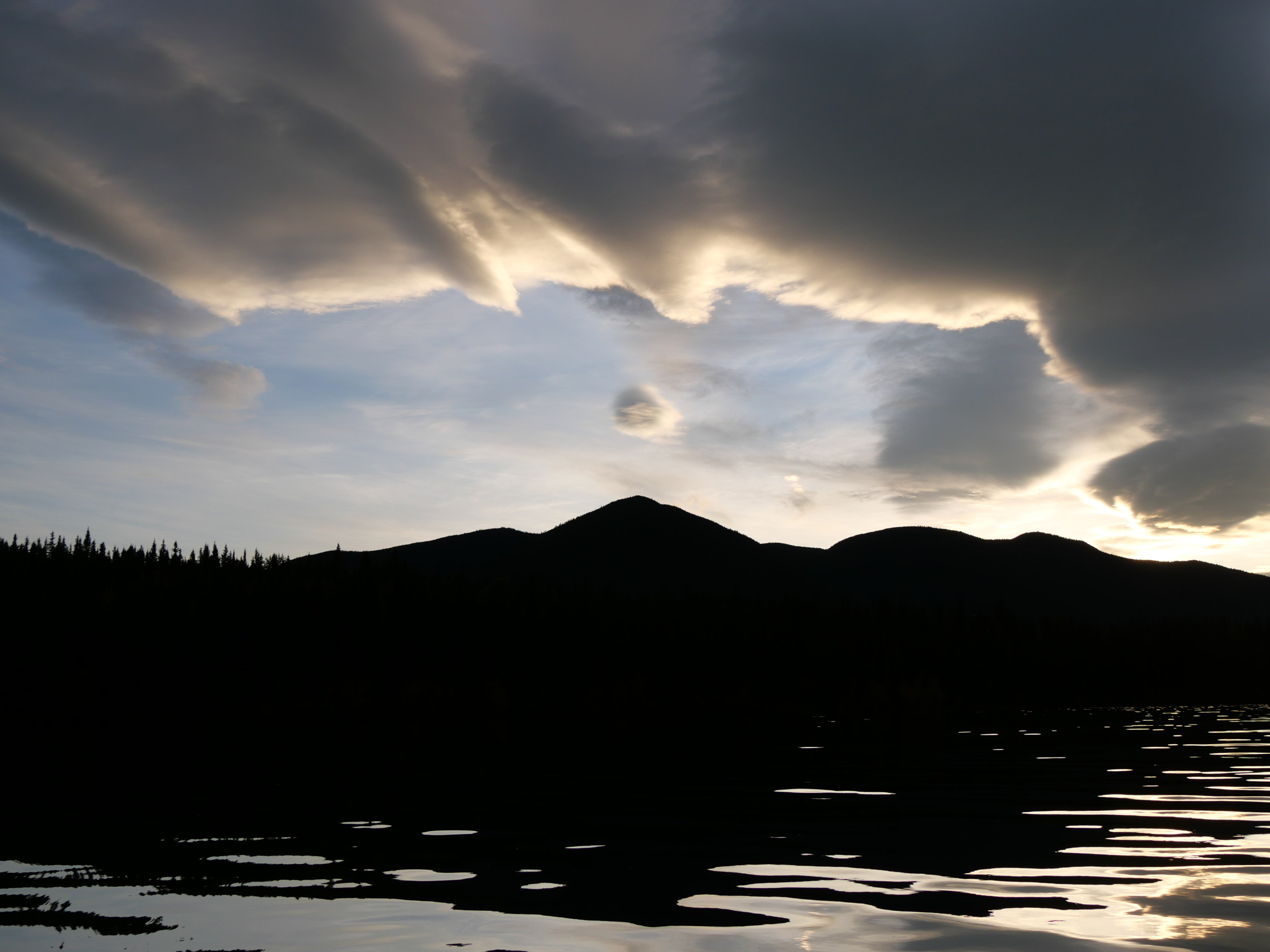Two fish stare from deep in the subconscious, in rocks that naturally wear into patterns humanly recognizable as faces.
Mara Lake
It’s a good place for some magic. Here’s a couple other fish, with their staring days done.
 Shaman With Two Stripped Fir Branches for Drying Fish, Mara Lake
Shaman With Two Stripped Fir Branches for Drying Fish, Mara Lake
After all, this is rock with many lines of power running through it.
 Not just regular bands of cloud, either. Here’s a flowing of a more watery kind.
Not just regular bands of cloud, either. Here’s a flowing of a more watery kind.
 If you’re going to speak your thoughts to the world, this is the place to do it. Might as well get it all down.
If you’re going to speak your thoughts to the world, this is the place to do it. Might as well get it all down.
 Your audience? The lake and the fish and the rock. This is all on a sheer cliff high above the water. Originally, these power drawings would have been allowed to weather and fade, until their power had passed into the lake, as does the rock itself.
Your audience? The lake and the fish and the rock. This is all on a sheer cliff high above the water. Originally, these power drawings would have been allowed to weather and fade, until their power had passed into the lake, as does the rock itself.
It draws the power of the sky down as rain.
This is the shadow rain makes. It contains its energy.
Now, though, these pictographs are all carefully retouched, to preserve them as museum images…
 … by people who no longer speak this language of power. My guess is that that’s a botched turtle on the right. Make no mistake, though, the power still remains. For anyone with eyes to see, it’s clear that people read the rock long before they started leaving their own marks on it.
… by people who no longer speak this language of power. My guess is that that’s a botched turtle on the right. Make no mistake, though, the power still remains. For anyone with eyes to see, it’s clear that people read the rock long before they started leaving their own marks on it.
There’s much to read.
Skull in the Rock
Or is that much to write?
Another Skull
At any rate, power is so deeply ingrained in this rock that when it breaks up, its power is not less.
In fact, because it is portable, perhaps it is more.
 Traditional pigments for writing on rock were salmon oil, which was locally sourced, and red ochre, which was traded from Tulameen in the south. Originally, the Tulameen people were Tsilqh’otin traders, carrying over half the continent from the obsidian streambeds of Anahim Peak, which is an outlier of the Rainbow Shield Volcano. Seemingly, the magic of ochre proved stronger than hi-tech weapons flaking in the end, because they gave up the obsidian trade 2000 years ago, but kept the ochre … well, up to the present, actually, at least here in Secwepemc territory. The thing about red ochre, or a power cliff reduced to a small stone on the beach …
Traditional pigments for writing on rock were salmon oil, which was locally sourced, and red ochre, which was traded from Tulameen in the south. Originally, the Tulameen people were Tsilqh’otin traders, carrying over half the continent from the obsidian streambeds of Anahim Peak, which is an outlier of the Rainbow Shield Volcano. Seemingly, the magic of ochre proved stronger than hi-tech weapons flaking in the end, because they gave up the obsidian trade 2000 years ago, but kept the ochre … well, up to the present, actually, at least here in Secwepemc territory. The thing about red ochre, or a power cliff reduced to a small stone on the beach …
 … is that you can pick it up and carry it and set it down somewhere else.
… is that you can pick it up and carry it and set it down somewhere else. You can be, in other words, the rain, or the glacier. That’s powerful.
You can be, in other words, the rain, or the glacier. That’s powerful.
 Does the magic work? Of course it does. It makes you pay attention and make the earth into a pattern that your consciousness then fills. The earth becomes an art form. Before long you can read your subconscious mind in this…
Does the magic work? Of course it does. It makes you pay attention and make the earth into a pattern that your consciousness then fills. The earth becomes an art form. Before long you can read your subconscious mind in this…
 … and carry around the power of the sea in a piece of old seabed like this …
… and carry around the power of the sea in a piece of old seabed like this … … among these volcanic islands that have drifted in from the middle of the Pacific so long ago. Scientific understanding is like the museum-artefact impulse: it freezes a process. Much practical power is gained. Much human power is lost. Humans came to consciousness here by making a language out of the earth. Reading this cliff would have been like reading the weather.
… among these volcanic islands that have drifted in from the middle of the Pacific so long ago. Scientific understanding is like the museum-artefact impulse: it freezes a process. Much practical power is gained. Much human power is lost. Humans came to consciousness here by making a language out of the earth. Reading this cliff would have been like reading the weather.
 Things that stay in one place are, perhaps, not the things that endure. Language isn’t all for human ears, because humans didn’t invent it. They just paid attention to it. Ask the mountains about that. Or ask this person, floating above mountains far along on their slow journey back to the sea.
Things that stay in one place are, perhaps, not the things that endure. Language isn’t all for human ears, because humans didn’t invent it. They just paid attention to it. Ask the mountains about that. Or ask this person, floating above mountains far along on their slow journey back to the sea.
Categories: Arts, Erosion, First Peoples, Water























What about the woman-figure climbing out of the lake, Harold? Why would she leave the water? I sense another story here.
LikeLike
There are hundreds of stories. It would be fascinating to map them.
LikeLike
brilliance again good man… a feeling of the sympathetic magic of the languages of form… tones marriages to soundscapes and the revelations of wind and waters and fires revealed in the shaping of stone… the way our seeing is changing the revelations of the stones and the art… was just recalling steiners insights into language as folk soul – resident in the landscape of a peoples… and the mystery of modern english torn from its moorings adrift in weave on the sea of us all… and thinking of canadas poet laureates on cbc’s ideas invoking the idea of poems becoming stronger than their poets… sails for the crossings…
LikeLike